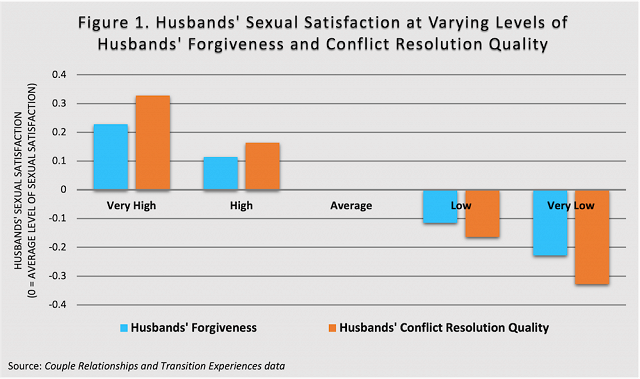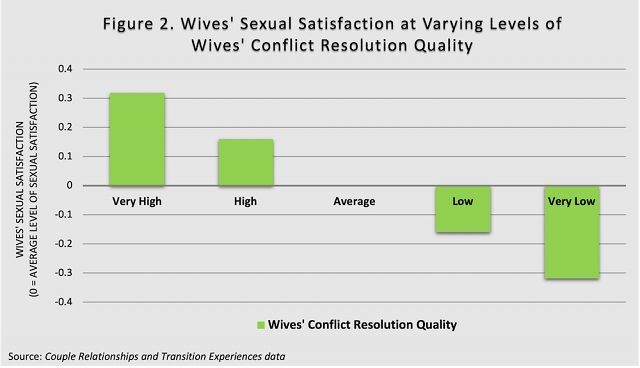Highlights
- Husbands who are more forgiving tend to report that they are more sexually satisfied, per a recent study. Post This
- Greater conflict resolution quality was connected to greater sexual satisfaction for both husbands and wives. Post This
- Conflict resolution and forgiveness, it turns out, can influence sexual satisfaction. Post This
You know the scene: the couple on screen starts fighting. Things get heated. Then, suddenly, the tension breaks, and the fight quickly turns into passionate reconciliation. Although movies might not be the best source to learn about healthy relationships, this common cinematic trope may be on to something.
Conflict resolution and forgiveness, it turns out, can influence sexual satisfaction.
Previous research indicates that sexual satisfaction is affected by many unique factors including sexual frequency, verbal and nonverbal sexual communication, and joint religious activities in the home. As such, understanding sexual satisfaction through just one variable may not be the most valid approach.
Together with Dr. Chelom Leavitt, Joshua Timmons, and Dr. Jason Carroll from Brigham Young University and based on previous research, we identified conflict resolution and forgiveness as two possible variables that may be associated with marital sexual satisfaction.
Previous research about conflict resolution and sexual satisfaction is scarce and has resulted in mixed findings. One study found that better conflict resolution leads to increased sexual satisfaction, while another found no association.
With regard to forgiveness and sexual satisfaction, the research is equally rare. However, sexual differences between men and women, such as sexual desire differences, can sometimes lead to conflict—necessitating the need to forgive to avoid damaging a sexual relationship. Furthermore, forgiveness might be linked with sexual satisfaction due to forgiveness’ association with marital satisfaction and with marital satisfaction’s association with sexual satisfaction. Indeed, last year, one study found forgiveness as one reason why mindfulness benefitted relational and sexual satisfaction.
Our research sought to contribute to these gaps in the literature. The data we utilized was collected from 2,114 mixed-sex, recently married couples living across the United States. These couples, who were randomly selected from all U.S. counties, represented a variety of racial and cultural backgrounds. Wives and husbands in these couples completed surveys containing questions on how forgiving they were towards their partner, the quality of their conflict resolution, and their levels of sexual satisfaction.
We used this data to investigate the extent to which wives' and husbands' forgiveness and conflict resolution were associated with both an individual's own sexual satisfaction as well as their partner's. A modern statistical approach was used to test our research questions.
For forgiveness, our results indicate that wives’ forgiveness showed no significant impact on their sexual satisfaction. However, we found that husbands who are more forgiving tend to report that they are more sexually satisfied, as illustrated by Figure 1 below.

Reading the chart from left to right, we see that husband's sexual satisfaction varies depending on how forgiving husbands tend to be. In this chart, husband's predicted sexual satisfaction at varying levels of husband's forgiveness is represented by the blue bars. Specifically, we observed that husbands with high levels of forgiveness tended to have greater than average sexual satisfaction, where the average level of sexual satisfaction is at zero. In contrast, we observed that husbands with low levels of forgiveness tended to have lower than average sexual satisfaction.
Of note, greater conflict resolution quality was connected to greater sexual satisfaction for both husbands and wives. This finding for husbands is represented above with the orange bars and below for wives with the green bars.

The narrative is the same for both husbands and wives: individuals with high levels of conflict resolution quality tend to have above average levels of sexual satisfaction, while individuals with low levels of conflict resolution quality tend to have below average levels of sexual satisfaction.
If anything, our findings further the claim that sexual satisfaction is an intricate construct. Many scholars in the past have focused on understanding how things like sexual communication and relationship satisfaction relate to sexual satisfaction. Other variables—including conflict resolution and forgiveness—might also apply. Whether in cinema or real life, couples that resolve conflict well and find a way to forgive each other might also consequently enjoy a superior sex life.
Matthew Saxey is an incoming M.S. student at BYU’s Marriage, Family, & Human Development Program. David Allsop is a Ph.D. student at Dalhousie University in the Department of Psychology and Neuroscience.










